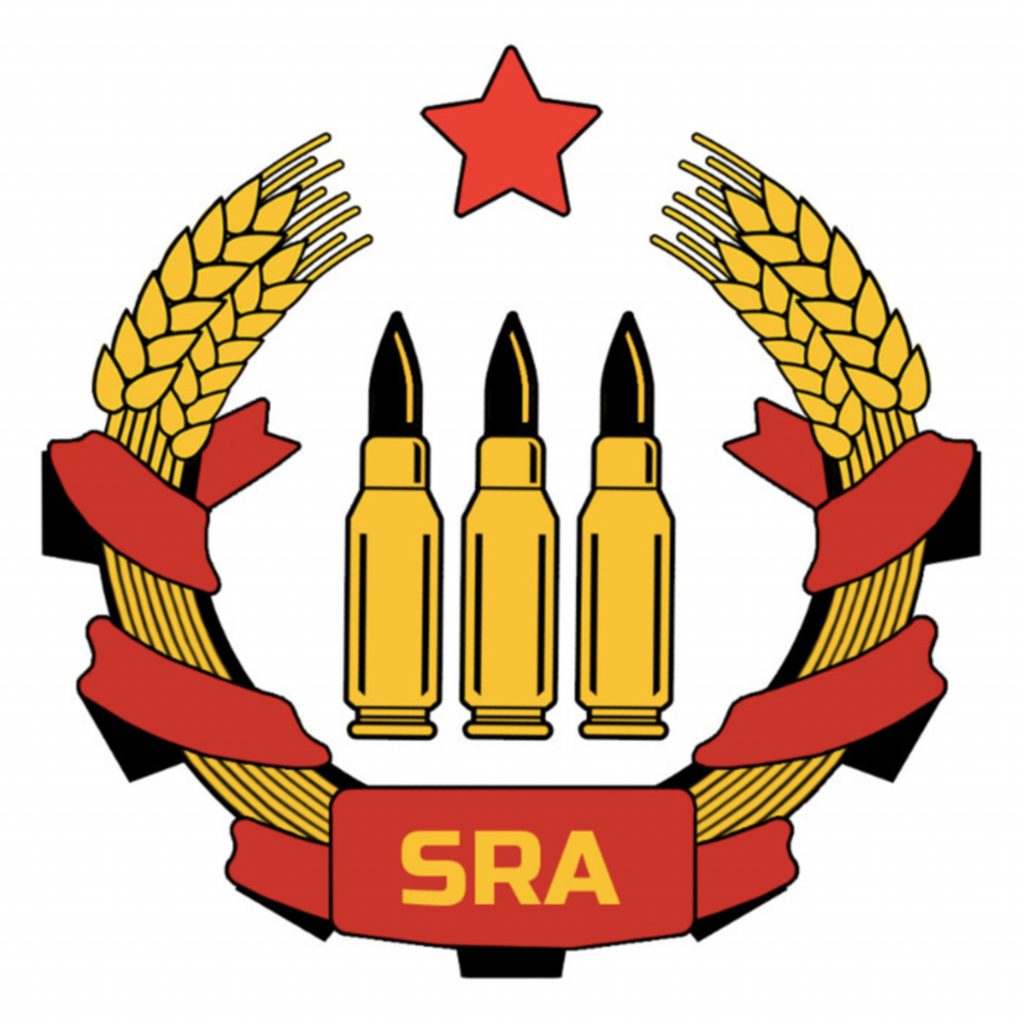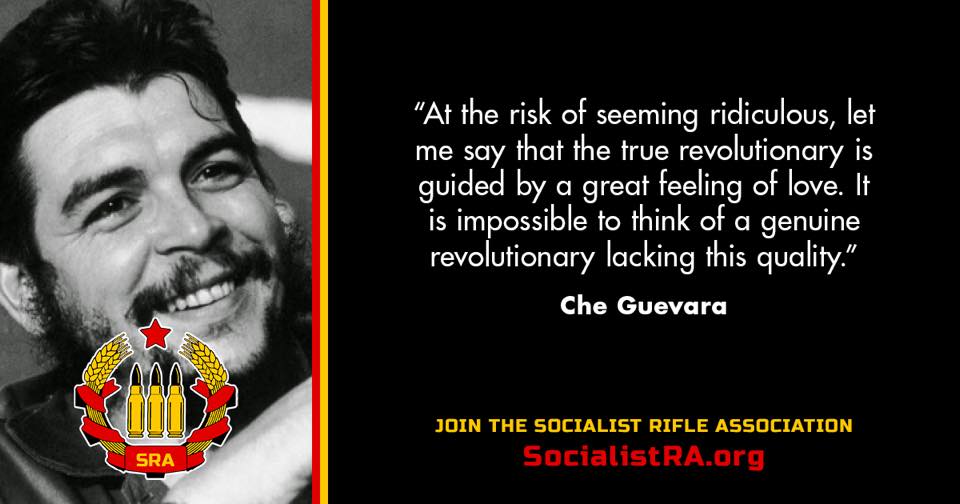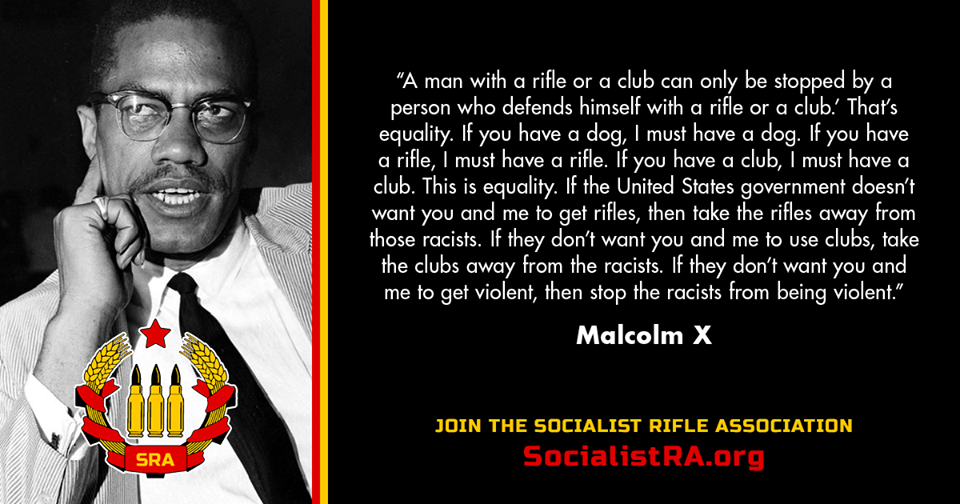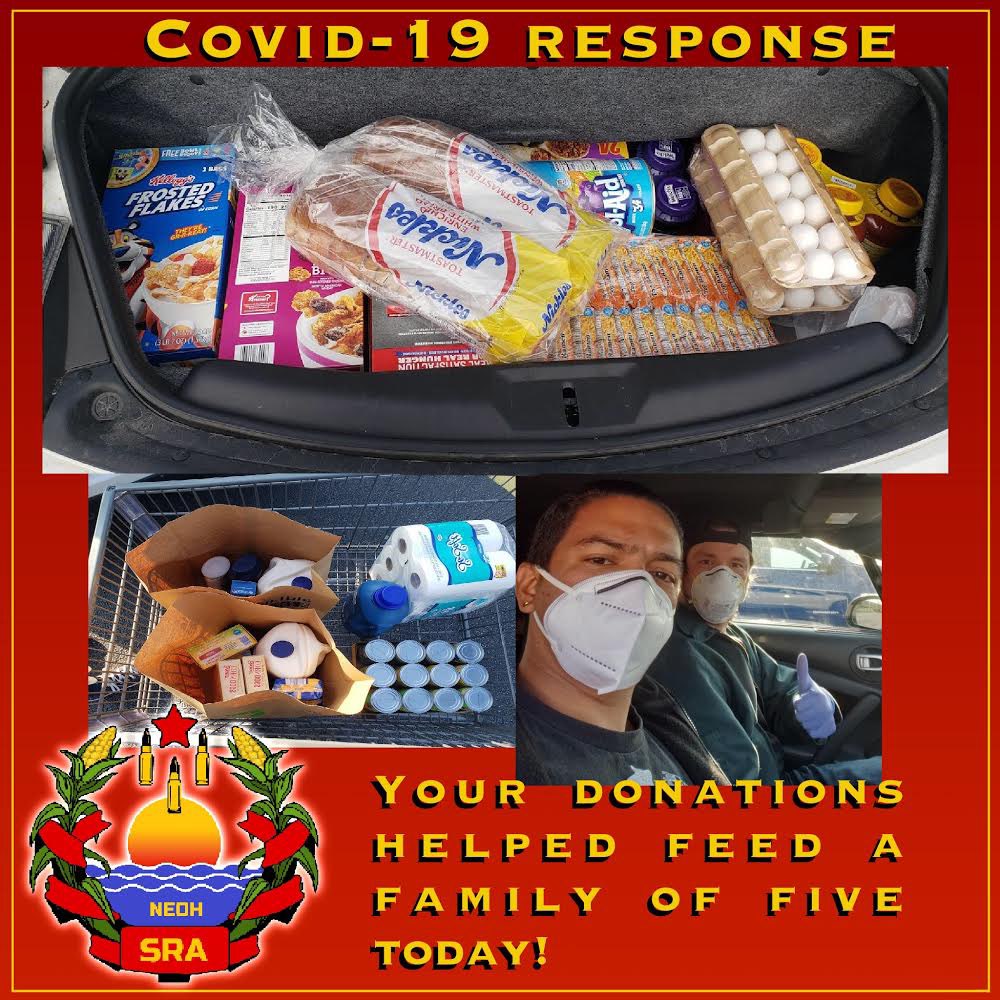Sean Meleady sheds light on contemporary ‘gun rights’ activism in the USA and discusses the work and politics of the Socialist Rifle Association.
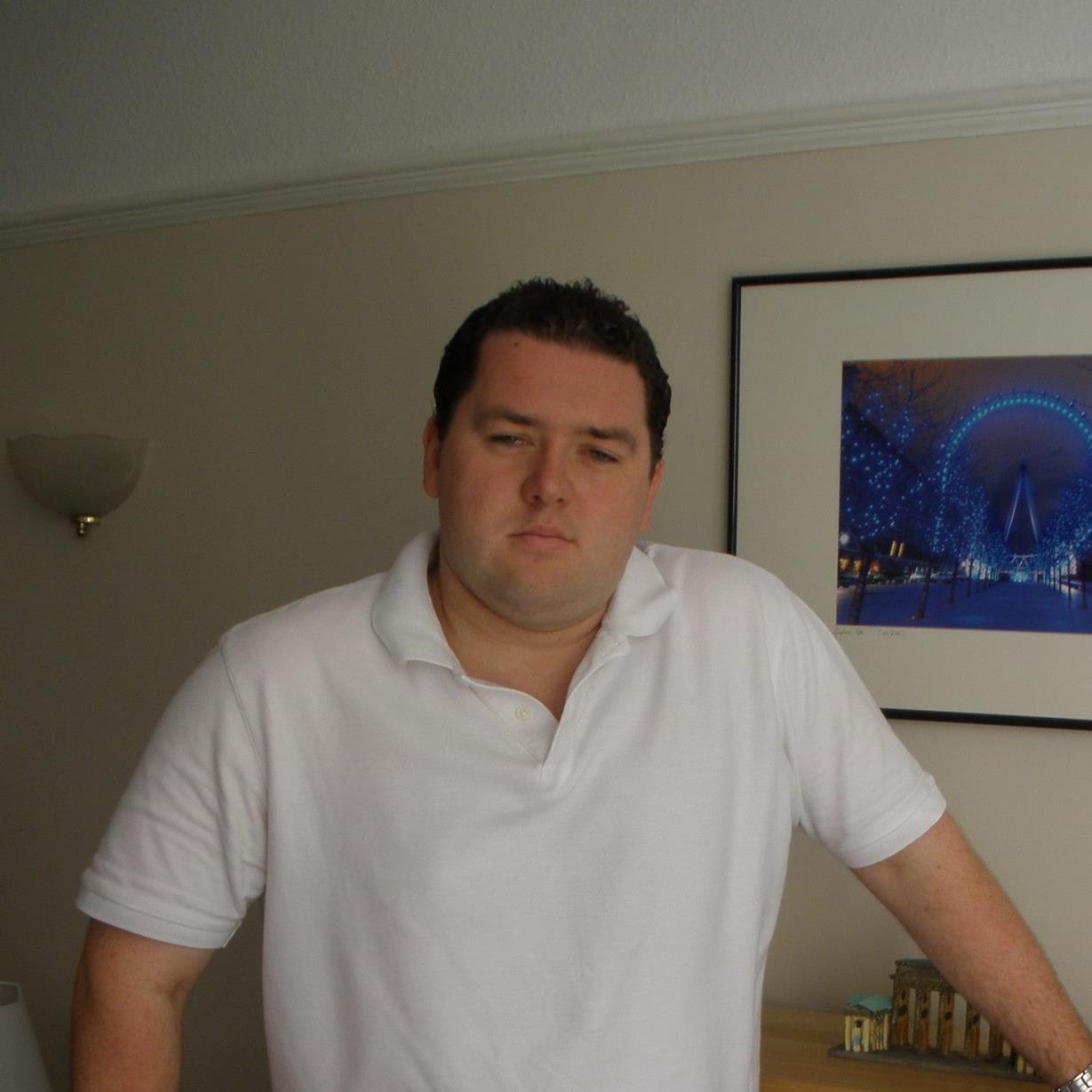
You could be forgiven for thinking of overweight middle aged white men in the countryside in militias or Republican politicians when gun rights in the USA are mentioned. Alternatively if you’ve seen Michael Moore’s documentary Bowling for Columbine made after the 1999 Columbine High School shooting and attempting to explain American gun culture you may think of faded Hollywood icon Charlton Heston’s attempt at defending the right of US citizens to bear arms.
In a sense you are right, every time there is a mass shooting Republican politicians resist calls for gun control often citing mental illness while Democrats tend to argue for various degrees of restrictions on gun ownership. In the popular imagination one organisation above all others, the National Rifle Association (NRA), leads opposition to gun control. John F Kennedy and Michael Moore were members in the past but since the 1970s the NRA has become increasingly right wing and associated with the Republican Party.
In a 2012 Gallup poll 82% of Republicans saw the NRA favourably compared with 55% of Democrats, by 2019 these figures were 78% and 32%. In 2016 the NRA endorsed Donald Trump for president while only financially backing a handful of Democrat politicians compared to over a hundred Republicans.
There is one group who are aiming to end the right wing’s monopoly on gun rights activism, the Socialist Rifle Association. Created in 2013 as a Facebook page as ‘something of a joke’ the SRA now has 3,000 members in all 51 states as well as Puerto Rico and 52 local ‘chapters’ in 33 states.
In August 2019 the organisation was recorded as having 2,500 paying members with membership more than doubling last year. Members pay $25 to join and receive a membership card as well as ‘access to a community platform, and a safe space for learning’.
According to the SRA the aim of the group is “to provide an alternate to the mainstream, toxic, right-wing, and non-inclusive gun culture that has dominated the firearms community for decades. We seek to provide a safe, inclusive, and left-leaning platform for talking about gun rights and self-defence, free from racist and reactionary prejudices, while providing a platform for the working class to obtain the skills necessary for all aspects of community defence.”
The SRA are also keen to emphasise the broad basis of their organisation in terms of ideology and gender as well as the class based nature of the organisation describing themselves as “working class, progressive, anarchist, socialist, communist, eco-warrior, animal liberator, anti-fascist, anti-racist, anti-capitalist, PoC, LGBTQ-plus“.
Potential SRA members have to accept a number of ‘points of unity’ in order to be admitted to the organisation. For example the fact that the SRA is a multi-tendency organisation including Anarchists, Communists and Social Democrats united by their class who respect their political differences. They are also expected to oppose all forms of oppression and exploitation as well as the disarmament of the working class and to support their class physically and mentally.
SRA members are also expected to volunteer in their local communities in order to further connections between political radicals and unorganised communities. This may involve feeding, housing and protecting working class and other marginalised groups in their communities. They are also expected to identify with the following self-description ‘We are working class and poor people dedicated to educating our class in the safe use of firearms for personal and community self-defence as well as recreation and subsistence hunting‘.
Gun Lock clinics are also organised at neutral venues such as churches and libraries where members conduct demonstrations of gun lock use as a form of firearm education. SRA members also provide free gun locks and literature about the safe storage of firearms.
The SRA has also developed an Instructor Program which involves financing volunteers to become firearm instructors. They are also seeking to develop a Range Affiliate Program with local gun ranges to ensure SRA members who visit them are not harassed on the basis of race, gender, sexuality, political belief or other characteristics.
Alex Tackett based in Kansas and President of the SRA is keen to emphasise that the group is a very different from the NRA and right wing pro-gun rights militia groups. This is something that was reflected in the foundation of the group.
‘The SRA had a few different starts as online communities of leftish gun owners attempting to find their place in the political arena. Eventually the organization was formed in March 2018 by around a dozen committed organisers to make a leftist education advocacy resource for gun owners on the left.
“The big goal was and is to shift the gun culture debate away from the right wing reactionary culture that dominates it now and ensure that marginalized communities are able to exercise their second amendment rights as well.”
Tackett is absolutely adamant that the SRA is not a left wing version of the NRA in the sense that it isn’t a lobbying organisation but is based around community solidarity, education and solidarity.
“The NRA is by and large an advocate organisation for the gun lobby. NRA members receive no particular benefits beyond getting some merchandise and newsletters. The SRA is a membership and chapter based organization, with local putting on range days, social gatherings and educational sessions. The SRA also engages in mutual aid and disaster relief during times of crisis.“
Mutual aid and disaster relief have been vitally important parts of SRA activity. In September 2018 the Georgia chapter delivered food and other supplies to those sheltering from Hurricane Florence. Three months later the SRA started a relief fund for Florida residents affected by Hurricane Michael and supplies to hurricane shelters in North Carolina. This was done working together with other socialist groups such as The Democratic Socialists of America and particularly helped undocumented migrants who were unable to receive assistance from federal bodies.
In response to Hurricane Dorian in August 2019 the SRA launched a fundraiser and in September it organised volunteers in both North and South Carolina to provide supply deliveries in their local communities including the Lumbee Tribe in Robeson County, North Carolina.
During the Coronavirus epidemic the SRA has been engaging in many mutual aid and community support activities. In Los Angeles this has involved working with the Green Party to hand out food and hygiene products. SRA activists in Washington DC have organised the delivery of vegan meals in Philadelphia they have been distributing face masks and Northeast Ohio SRA have been raising money for food and hygiene products.
As Tackett reaffirms these mutual aid projects are vital in embedding SRA local chapters in the communities they are based in and showing that they are different from the NRA and right wing militias.
“We’ve done three hurricane relief operations at the national level and our local chapters have done dozens of smaller operations in their locales for things like the California wildfires. These typically involve supply delivery, be it food or hygiene products or masks. Currently various chapters are delivering products to folks who can’t leave their homes.”
One of the distinctive aspects of the SRA is its strong support for LGBTQ and Transgender rights not just politically but also the right to self-defence from violent homophobic rights. Although the Pink Pistols a LGBTQ gun rights organisation headed by a transgender president Erin Palette has seen a membership surge since the homophobic shooting at the Pulse nightclub in Orlando and the election of Trump in 2016 the SRA has attracted a number of LGBTQ and transgender members.
According to Tackett this is mainly because of the discrimination that LGBTQ and transgender gun rights activists face in other firearms groups.
“A third of our membership is part of the LGBTQ community, with around 15 per cent of our membership identifying as transgender. A third of our central committee is trans as well. Members of the LGBTQ community so often face extreme discrimination in firearms spaces, and so we work towards pushing back against that as much as possible.”
Although the SRA was predominately male at its foundation more female members have joined and several members of the Central Committee identify as female including Tackett the Vice President, chapter delegate from San Francisco and the director of Chapter Organizing. 20% of SRA member are non -white but, unlike the African American gun rights and self-defence Huey P Newton Gun Club, the SRA does not allow its members to openly carry weapons in public.
In recent decades as American politics and the gun rights debate has descended into a culture war between Liberals and Conservatives. While Republicans have generally continued their support for the gun lobby Democrats have increasingly campaigned for gun control.
Barack Obama made efforts to impose more gun control measures during his second term in office particularly after the 2012 Sandy Hook elementary school shooting. However efforts to ban assault weapons, high capacity magazines and introduce criminal background checks were thwarted by Congress.
When running for President in 2016 Hillary Clinton emphasised the importance of expanded background checks, a ban on assault weapons, preventing people suffering from mental illness from buying guns and most radically to challenge the power of gun lobbyists. This earned her an F rating from the NRA encouraging them to endorse Trump despite his patchy history of support for gun rights.
Joe Biden the presumptive Democratic nominee for this year’s Presidential election not only supports bans on assault weapons and high capacity magazines but also wants to reduce the stockpiling of weapons. A Biden administration would also end the online sale of firearms and ensure that background checks are compulsory for all firearm purchases.
Vermont Senator Bernie Saunders the main challenger to Clinton in 2016 and Biden in 2020 has a more mixed record having previously voted against gun control methods. However in this year’s race Saunders reiterated his support for background checks and a ban on assault weapons.
Therefore the Democratic Party appears to be out of step with groups such as the SRA possible reinforcing the notion of the party as a liberal elitist organisation dominated by Liberals in coastal areas such as California, New York and Seattle areas where gun control is usually stronger. Unsparingly Tackett is unimpressed with the Democrats attitude towards gun control.
“To paraphrase a quote, America is a one party state with two parties to key up appearances. Gun control is one of those issues our parties like to disagree on, to a certain extent. The SRA doesn’t make blanket endorsements of candidates for ideological and legal reasons. Obviously Bernie Saunders has the least restrictive program of the Democrats right now, but still has language in his gun policy we would rather he didn’t have.
“As far as Biden and Obama’s policies are concerned, they were generic liberal policies, and certainly not in line with our understanding of the inalienable right to self and community defence.”
Gun control and rights have barely featured in British political debate since the blanket ban on handguns following the 1996 Dunblane massacre. However perhaps the example of the SRA in a very different context in the USA can provide a different perspective if not change minds. It also shows the importance of community action and solidarity as well as building support in working class communities. Arguably it is also a blueprint to overcome the divide between class and identity politics which is prevalent throughout the left.
Sean Meleady

